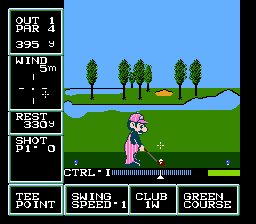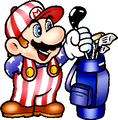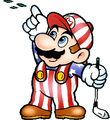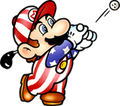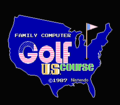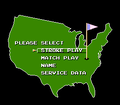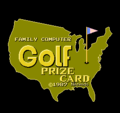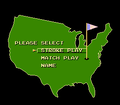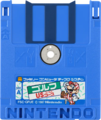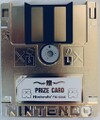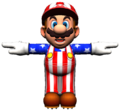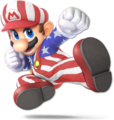Golf: U.S. Course: Difference between revisions
(→Gallery: wrong game) |
No edit summary Tags: Mobile edit Advanced mobile edit |
||
| Line 29: | Line 29: | ||
*Stroke Play: Up to four players can try to do their personal best. The other players look like Mario (or the hidden female character) but with a different overall color. Player 2 is green, Player 3 is blue, and Player 4 orange. Player 3 uses Player 1's controller, while Player 4 has to share it with Player 2. The 1 Player Stroke Play scores were used in the tournament that was contested by 77,000 players.<ref>{{cite|url=famicon.s348.xrea.com/entries/19870614_golfusc|title=ゴルフUSコース|publisher=Famicon Masterpieces|accessdate=January 23, 2021}}</ref> | *Stroke Play: Up to four players can try to do their personal best. The other players look like Mario (or the hidden female character) but with a different overall color. Player 2 is green, Player 3 is blue, and Player 4 orange. Player 3 uses Player 1's controller, while Player 4 has to share it with Player 2. The 1 Player Stroke Play scores were used in the tournament that was contested by 77,000 players.<ref>{{cite|url=famicon.s348.xrea.com/entries/19870614_golfusc|title=ゴルフUSコース|publisher=Famicon Masterpieces|accessdate=January 23, 2021}}</ref> | ||
*Match Play: Two players, controlling Mario and his green clone, compete against each other. Unlike in ''Japan Course'', there is no computer opponent. A player can forfeit a round by pressing {{button|NES|select}}, holding {{button|NES|pad}} up, and pressing {{button|NES|start}}. | *Match Play: Two players, controlling Mario and his green clone, compete against each other. Unlike in ''Japan Course'', there is no computer opponent. A player can forfeit a round by pressing {{button|NES|select}}, holding {{button|NES|pad}} up, and pressing {{button|NES|start}}. | ||
There are four slots to save scores (represented by flags, lowered by [[ | There are four slots to save scores (represented by flags, lowered by [[Diskun]] when overwriting) with blank slots recorded as 900. | ||
==Contest and alternate version== | ==Contest and alternate version== | ||
Revision as of 18:31, August 11, 2024
| Golf: U.S. Course | |
|---|---|
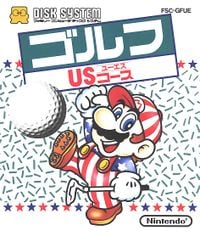 For alternate box art, see the game's gallery. | |
| Developer | HAL Laboratory |
| Publisher | Nintendo |
| Platform(s) | Family Computer Disk System |
| Release date | Template:Release[?] |
| Language(s) | English (United States) |
| Genre | Golf |
| Mode(s) | 1–4 players alternating |
| Format | FDS:
|
| Input | NES:
|
| Serial code(s) | FMC-GFUE |
Golf: U.S. Course (also formatted as Golf: US Course)[1] is a Japan-exclusive golf game released for the Family Computer Disk System on June 14, 1987. It is the first game of the Super Mario franchise to support more than two players. Gameplay is more similar to that of the later NES Open Tournament Golf than to that of its companion title, Golf: Japan Course, which was released a few months earlier. Despite the name, the holes are fictional.
Gameplay
Gameplay is similar to the previous Golf: Japan Course, but with further features added. The course view and course map are now separate screens that can be toggled between, alongside the green view. This allows for a greater amount of detail, especially on the course view. Dense trees are no longer out of bounds, but are navigable areas; they always have at least a small amount of land around them, even if they appear to be in water from the map. The wind meter shows a crosshair within a larger crosshair to show the direction and speed relative to whichever direction the player will putt. There are four options along the bottom of the screen in course view, which can be navigated between by holding down and using the
left and right, while doing the same but using the
up and down to change their values. These options are:
- Tee point: This option is only functional before the first successful stroke, and allows the tee to be moved left and right.
- Swing speed: Changes how fast Mario swings, from 1 (slowest) to 3 (fastest). Faster strokes hit harder, but are more difficult to hit cleanly.
- Club: Switches between the 14 available clubs (the same as in the previous games).
- View: Switches between the three viewpoints, though once the player is on the green it becomes locked.
Additionally, the score sheet can be viewed by pressing . Unlike in Japan Course, rather than a loading screen appearing every 4-5 rounds with a coffee shop, the loading screen appears every two rounds with a view of the score sheet thus far.
There are two game modes:
- Stroke Play: Up to four players can try to do their personal best. The other players look like Mario (or the hidden female character) but with a different overall color. Player 2 is green, Player 3 is blue, and Player 4 orange. Player 3 uses Player 1's controller, while Player 4 has to share it with Player 2. The 1 Player Stroke Play scores were used in the tournament that was contested by 77,000 players.[2]
- Match Play: Two players, controlling Mario and his green clone, compete against each other. Unlike in Japan Course, there is no computer opponent. A player can forfeit a round by pressing
, holding
up, and pressing
.
There are four slots to save scores (represented by flags, lowered by Diskun when overwriting) with blank slots recorded as 900.
Contest and alternate version
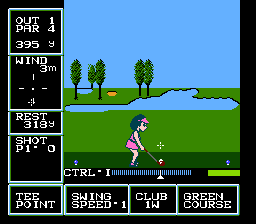
Like Japan Course, the game comes on a blue disk, meaning it is compatible with the Disk Fax, a device found in public places across Japan such as department stores. These machines would send the player's saved games and high score information to Nintendo. Nintendo held a contest centered around this game. The top 100 players received a trophy, and they along with 9,900 others received a gold Famicom cartridge of Punch-Out!! There was also an unannounced prize, which was a special version of the game that came on a gold disk known as Golf: Special Course (labeled Golf: Prize Card on the title screen)[3] and was given out to 1,000 randomly chosen players who had scored a hole-in-one. This version was harder due to its "Special Course." It also has a hidden character[4] that can be unlocked if the total score is 320 or under after four games. At the Stroke Play menu, holding and pressing
replaces Mario with a female character. She has the same abilities as Mario. This character was once unlockable in the blue disk version, but it required the extra step of registering the disk with the Disk Fax, which has been discontinued—as such, she is available today for that edition only on unformatted copies that had previously gone through the Disk Fax.
Staff
- Main article: List of Golf: U.S. Course staff
Gallery
Lady golfer (player one)
References in later games
- Mario Golf: World Tour: A costume, golf clubs, and a golf ball based on Mario's attire appear in this game for Miis.
- Super Smash Bros. for Nintendo 3DS / Wii U: One of Mario's palette swaps is based on his stars-and-stripes-based clothing in Golf: U.S. Course, although NES Open Tournament Golf is more frequently cited.[5]
- Super Mario Odyssey: The stars-and-stripes clothing once again appears.
- Super Smash Bros. Ultimate: Mario's palette swap based on his outfit from this game returns.
- Mario Golf: Super Rush: Mario's golf outfit from Golf: U.S. Course returns in this game as a reward for achieving an A- rank in Ranked Match during January 2022.
- Mario Kart Tour: Mario's golf outfit makes an appearance in this game as a playable driver, starting from the 2022 Los Angeles Tour.
The Golf Outfit's model from Super Mario Odyssey
Names in other languages
| Language | Name | Meaning | Notes |
|---|---|---|---|
| Japanese | ゴルフUSコース[?] Gorufu Yūesu Kōsu |
Golf: US Course |
- Golf: Special Course
| Language | Name | Meaning | Notes |
|---|---|---|---|
| Japanese | ゴルフスペシャルコース[?] Gorufu Supesharu Kōsu |
Golf: Special Course |
References
- ^ HISTORY | Mario Portal |. Mario Portal (English). Retrieved May 19, 2024.
- ^ ゴルフUSコース. Famicon Masterpieces. Retrieved January 23, 2021.
- ^ ◆ゴルフUSコースの景品の一つのはずなのにその後も登場。『ゴルフスペシャルコース』. Family Computer Disk System Art Database. Retrieved March 31, 2021.
- ^ kikai / マリオガイド (July 17, 2021). 幻のマリオキャラを探せ!【スーパーマリオ調査隊】. YouTube. Retrieved July 31, 2021.
- ^ Sakurai, Masahiro (July 10, 2014). Post by Masahiro Sakurai. Miiverse. Archived October 17, 2017, 18:08:48 UTC from the original via Wayback Machine. Retrieved May 19, 2024.
External links
 This article is a stub. You can help the Super Mario Wiki by expanding it.
This article is a stub. You can help the Super Mario Wiki by expanding it.
